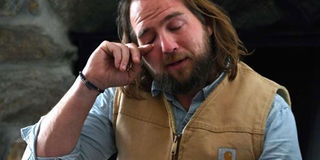American men let it all out at new support groups

'Evryman' Co-Founder Lucas Krump cries during a group meeting at Race Brook Lodge on December 6, 2019 in Sheffield, Massachusetts. PHOTO | AFP
What you need to know:
- Over the course of one weekend last month, no fewer than 55 men opened up about their weaknesses and insecurities
- Participants share their experiences and take part in group and one-on-one workshops where they learn to deal with feelings of anxiety and anger
- Evryman was founded in 2016, predating the #MeToo movement ignited by the Harvey Weinstein scandal in late 2017
In a chalet in the Massachusetts countryside, tears run down Lucas Krump's cheeks as he pours his heart out at one of a new kind of support group growing in popularity among American men.
"There were moments this year when I wanted to give up," the 40-year-old told the circle of participants, all tired of trying to live up to traditional male stereotypes.
The dozen men -- all white Americans ranging in age from their 20s to 60s -- were leading a retreat run by Evryman, a group that helps men shrug off the armour of masculinity to get in touch with their true feelings.
Like a sort of anti-"Fight Club."
OPENED UP
Over the course of one weekend last month, no fewer than 55 men opened up about their weaknesses and insecurities at the chalet, as snow fell quietly in the woods outside.
"I am sad. I am afraid," says Michael. He wished he could tell his family how he feels, but finds it hard.
The groups are seeing a surge in attendance, reflecting a shift in attitudes and increased curiosity about what it means to be male, particularly among US millennials -- as well as growing debate about so-called "toxic masculinity" fuelled by the #MeToo movement.
Another participant, Tom, is struggling to get over a recent breakup.
"I felt a lot of pain. I felt a lot of sadness," he says, as his fellow attendees look on with concern.
Participants share their experiences and take part in group and one-on-one workshops where they learn to deal with feelings of anxiety and anger.
Ryan Zagone has been attending sessions for six months.
"I grew up in Louisiana where the definition of a man is very narrow. Do you hunt or do you play football? And I didn't do either. I grew up feeling like an outsider," he said
"Coming here for the first time gave me role models of other ways to be as a man. How to be emotional in... a way that is powerful, loving, empathetic and at the same time strong," Zagone added.
INITIAL RISK
Michael Kimmel, a sociologist who specialises in masculinity, says many American men today worry they are not doing as well as their father or grandfather and feel like they are living in a "straightjacket."
"We live in a society in which every other man is a potential competitor, for jobs, for money, for access, for power," he explained.
"So we don't look at each other as brothers, we look at each other as rivals. So when you have that kind of relationship, you feel isolated."
Other support groups providing men's workshops and regular retreats include Junto and ManKind Project.
The idea behind them is not new. Writer Robert Bly pioneered self-help books and therapy sessions for men in the 1990s.
But Owen Marcus, who helped structure Evryman's programs, says the sessions would never have been this popular 20 years ago.
"Younger men are much more open to this. They're more willing to take that initial risk," he told AFP.
GLOBAL RECKONING
Evryman was founded in 2016, predating the #MeToo movement ignited by the Harvey Weinstein scandal in late 2017.
But the group and others like it have been brought into focus by the global reckoning on sexual misconduct, which has caused many men to question their own behaviour.
Evryman co-founder Dan Doty, says its purpose is not to deal directly with "toxic masculinity" but that the issue is never too far away.
"We need to meet men where they are and not come in and say, 'Hey, what you're doing is terrible.'"
Zagone believes men cause hurt because they themselves are hurting.
"So men having the ability to go deep into that hurt, to feel it and to process it in a more healthy way, then they're not hurting other people.
"That's the skill we're teaching here," he said.
SUPPORT NETWORK
Aside from retreats and week-long expeditions, Evryman has a network of support groups that gather locally on a regular basis, year-round, which it considers as important as the one-off events.
Evryman says its sessions are not intended to replace therapy. Many participants still see their regular therapist and come to Evryman for a support network.
Presently, Evryman retreats are mainly frequented by straight, white men. The group is working to attract more diverse participants.
Women cannot join for now, however, for fear they will inhibit the men.
Everyman says it has helped thousands of men. It hopes to help many more.
"We want to have a million do this work", says co-founder Sascha Lewis, for whom "there is a sense of a movement happening here in the US."





